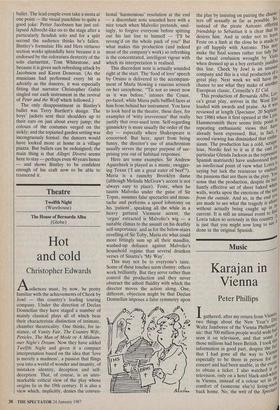Theatre
Twelfth Night (Warehouse)
Hot and cold
Christopher Edwards
Audiences must, by now, be pretty familiar with the achievements of Cheek by Jowl — this country's leading touring company. Under the direction of Declan Donnellan they have staged a number of mainly classical plays all of which bear their characteristic distinction of intimate, chamber theatricality. One thinks, for in- stance, of Vanity Fair, The Country Wife, Pericles, The Man of Mode or A Midsum- mer Night's Dream. Now they have added Twelfth Night and given it a compact interpretation based on the idea that 'love is merely a madness', a passion that flings you into a world of wonder and insanity, of mistaken identity, deception and self- deception. That, of course, is an unre- markable critical view of the play whose origins lie in the 19th century. It is also a view which, implicitly, denies the conven- tional 'harmonious' resolution at the end — a discordant note sounded here with a nice touch when Malvolio pretends, smil- ingly, to forgive everyone before spitting out his last line to himself — 'I'll be reveng'd on the whole pack of you!' But what makes this production (and indeed most of the company's work) so refreshing is the concentrated, intelligent vigour with which its interpretation is realised.
This discordant note is actually sounded right at the start. The 'food of love' speech by Orsino is delivered to the accompani- ment of Maria blowing a raucous screech on her saxophone. "Tis not so sweet now as it was before,' intones the Count, po-faced, while Maria pulls baffled faces at him from behind her instrument. You have to look hard in the theatre, these days, for examples of 'witty irreverence' that really justify that over-used term. Self-regarding gimmickry is more usually the order of the day — especially where Shakespeare is concerned. But here, apart from being funny, the director's use of anachronism usually serves the proper purpose of sur- prising you out of habitual responses.
Here are some examples. Sir Andrew Aguecheek is played as a manic, swagger- ing Texan CI am a great eater of beef?). Maria is a raunchy Brooklyn dame (although Melinda McGraw's accent is not always easy to place). Feste, when he taunts Malvolio under the guise of Sir Topas, assumes false spectacles and mous- tache and performs a spoof lobotomy on his 'patient', speaking all the while in a heavy guttural Viennese accent; the 'organ' extracted is Malvolio's wig — a suitable climax to the assault on his deathly self-importance. and as for the below-stairs revelling of Sir Toby, Maria etc what could more fittingly sum up all their maudlin, washed-up defiance against Malvolio's household regime than several drunken verses of Sinatra's 'My Way'.
This may not be to everyone's taste. Some of these touches seem clumsy: others work brilliantly. But they serve rather than control the production and they never obstruct the adroit fluidity with which the director moves the action along. One, different, objection might be that Declan Donnellan imposes a false symmetry upon the play by insisting on pairing the chase" ters off sexually as far as possible. ?;', instead of the pirate Antonio offering friendship to Sebastian it is clear that he desires him. And in order not to leave Feste on a limb at the close he is made to go off happily with Antonio. This may make the final scenes rather too tidy bur the sexual confusion wrought by Vseda when dressed up as a boy certainly unusual company line. Cheek by Jowl is an unusual company and this is a vital production of great play. Next week we will have the chance to see what they make of another European classic, Corneille's El Cid. This production of Bernarda Alba,LAr; ca's great play, arrives in the West Eflu loaded with awards and praise. As it was reviewed at length (Spectator, 20 Septeril. ber 1986) when it first opened at the Lyre Hammersmith there seems little point in repeating enthusiastic views that have already been expressed. But, in fact, a second viewing has diminished that enthir, siasm. The production has a cold, soliP1! lous, Nordic feel to it as if the cast ti° particular Glenda Jackson as the repressive.. Spanish matriarch) have understood fraT, an intellectual point of view what Lorca is saying but lack the resources to embody the passions that are there in the play. 1...L°. ' sense that the production, despite its bw. liantly effective set of sheer baked Wln walls, works upon the emotions of the teP from the outside. And so, in the end Y°ti t are made to see what the tragedy is aE' without actually being caught up lnld current. It is still an unusual event to wit Lorca taken so seriously in this country' .t is just that you might now long to see done in the original Spanish.


















































 Previous page
Previous page